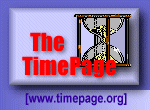
The Civil War Cycle
The Era of Slavery Expansion (1838-1859)
Home
Links
Search
TimeLog
Bookstore
Email
The 13
Original
American Colonies
Cohorts: missing generation - Hero, Civic Type
The Civil War
burst upon the American people before the
generational alignment was favorable for an event
of this magnitude. Few of the civic type
generation emerged from the devastation of the
Civil War!
Timeline events: Inner Driven Era
(1838) Morse code introduced
(1839) Henry Wadsworth
Longfellow publishes "Voices of the
Night", Charles Goodyear
"vulcanizes" rubber, Audobon
publishes "Birds of North America"
(1840) William
Harrison is elected President, Edgar
Allen Poe publishes "Tales of the Grotesque
and Arabesque"
(1841) James Fenimore Cooper
publishes the "Deerslayer" , Vice
President John
Tyler becomes President when William Harrison
dies after serving only 2 months in office
, first commercial use of petroleum
"Rock Oil" as a medicine
(1842) U.S.
Government moves Seminoles to Indian Territory
, New York Philharmonic is founded,
Massachusetts law limits children's (under 12)
workday to 10 hours
(1843)Marcus Whitman Crosses America on the Oregon
Trail, Dan Emmett stages his
Minstrel Show
(1844) Samuel F. B. Morse invents
the Telegraph, James
Polk elected President
(1845) Frederick
Douglas publishes his Autobiography, U.S.
Annexes Texas, John O'Sullivan coins term
"manifest destiny",
Knickerbocker Baseball
,
U. S. Navel Academy opens at Annapolis
(1846) U.S. declares war on Mexico, settlers of
the Donner
Party stranded on Donner Pass
, Smithsonian Institution established
(1847) American Medical Assoc. (AMA) established
(1848)Mormons migrate to Utah, Female Suffragists meet
at Seneca Falls, Zachary
Taylor elected President, Stephan
Foster publishes "Oh! Susanna",
U.S. wins Mexican
American War
(1849) California Gold
Rush, U.S. Dept. of the Interior is formed
(1850) The Compromise of 1850, Vice President Millard
Fillmore replaces Zachary Taylor who dies in
office, Nathaniel Hawthorne publishes
"The Scarlet Letter", Fugitive
Slave Act passed
(1851) Herman Melville
publishes "Moby Dick", YMCA
founded in Boston
(1852) Harriet Beecher Stowe
publishes "Uncle Tom's Cabin", Franklin
Pierce elected President, Stephan
Foster makes his only trip to the South and
publishes "My Old Kentucky Home,
Massachusetts passes the first school attendance
law, Boston Public Library founded
(1853) U. S. Fleet under Adm. Matthew Perry arrives in
Japan to seeking trade agreements, the
Gadsden Purchase adds the last piece of territory
to the lower 48, Charles Tiffany opens his
jewelry store, Antioch College opens its
doors to a coed student body, the B&O
Railroad connects Chicago to the east coast
(1854) The Kansas-Nebraska Act of 1854, The
Republican Party founded, Henry David
Thoreau pulishes "Walden",
Horace Smith and Daniel Wesson invent a gun
, Native American "Know Nothing"
party formed, 13000 Chinese immigrants
arrive to help build the transcontinental
railroads
(1855) William Walker overthrows
Nicaragua and makes himself president,
Walt Whitman publishes "Leaves of
Grass"
(1856)James
Buchanan elected President, Fredrick
Law Olmsted designs Central Park, fires of
slavery heat up as abolitionists John Brown and
his son's attach pro-slavery foes at Pottawatomie
Creek and legislators battle in congress
(1857) Dred Scott decision (1857), [Civil
War] (1857>), "Atlantic
Monthly" founded
(1858) Albert Bierstadt
begins his western travels, Lincoln
Douglass debates, first transatlantic
telegraph cable laid, religious revival
sweeps across the US, transcontinental
stagecoach and mail service starts
(1859) William Smith strikes oil in Pennsylvania,
Southern Convention at Vicksburg urges repeal of
anti-slavery laws, John Brown raids Harper's
ferry
Foreign Timeline Events: Victoria becomes Queen of England (1837), Charles Dickens publishes "Oliver Twist" (1837), Central American Federation disolves into Honduras, Nicaragua, Costa Rica and El Salvador (1839), Charles Darwin publishes his Journals from the Voyage of the Beagle (1839), Louis Daguerre invents "deguerrotype" photographic device (1839), first Henley Regatta and Grand National Steeple-Chase run in England (1839), New Zealand becomes a British colony (1841), Wagner premieres "The Flying Dutchman" (1843), Alexandre Dumas père publishes "The Three Musketeers" (1844), Robert Browning begins his courtship of Elizabeth Barrett (1844), YMCA founded in England (1844), Friedrich Engels publishes "The Condition of the Working Class in England" (1844), the Great Potato Famine in Ireland (1845), Henry Rawlinson deciphers Babylonian cuneiform writing (1846), Liberia becomes a free Republic (1847), each of the three Bronte sisters (Anne, Emily and Charlotte) publish novels (1847), Napoleon Bonaparte elected President of the French Republic (1848), revolution and rebellions occur throughout Europe (1848), Kelvin originates the absolute temperature scale (1848), Marx publishes the Communist Manifesto.(1848), David Livingstone charts the African interior (1849), Britain recognizes South African Republic's (Transvaal) independence (1852), The Second Empire under Emperor Napoleon III is formed (1852), Alexandre Dumas fils produces "Camille" (1852), Henri Giffard makes steam powered airship flight (1852), Crimean War begins (1853), Sir George Cayley makes first manned glider flight (1853), young Johannes Brahms publishes "Piano Concerto No. 1 in D minor" (1854), Florence Nightingale departs for Turkey to treat British soldiers (1854), Alfred Wallace publishes his theories on genetics (1854), Alfred Tennyson publishes "The Charge of the Light Brigade" (1854), Alexander II becomes Czar of Russia (1855), "Big Ben" is built in London (1856), very old human remains found in the Neanderthal Valley in Germany (1856), relations between India and British take a downturn as the Sepoy Rebellion begins (1857), George Eliot (Mary Ann Evans) publishes "Adam Bede" (1859), work begins on the Suez Canal (1859), Charles Darwin publishes Origin of the Species (1859).
![]() Return to the Civil War Cycle
Return to the Civil War Cycle
![]() Back to the Revolutionary Cycle
Back to the Revolutionary Cycle
![]() On to the World War Cycle
On to the World War Cycle
| You can support this site by shopping at AllPosters.com |

[Lessons]
Hosted by InMotion
 |
GENERATIONS , William Strauss and Neil Howe, 1991, William Morrow Publisher, New York. The Fourth Turning , William Strauss and Neil Howe, 1997, Broadway Books Publisher, New York. |
 |
| contact webmaster |
| [ TOP ] | Copyright © 2007 [The TimePage] All rights reserved. | [ HOME ] |